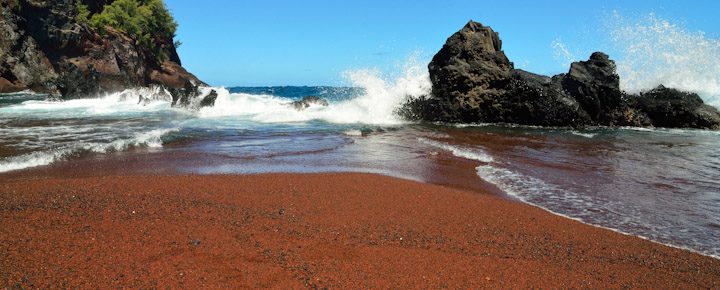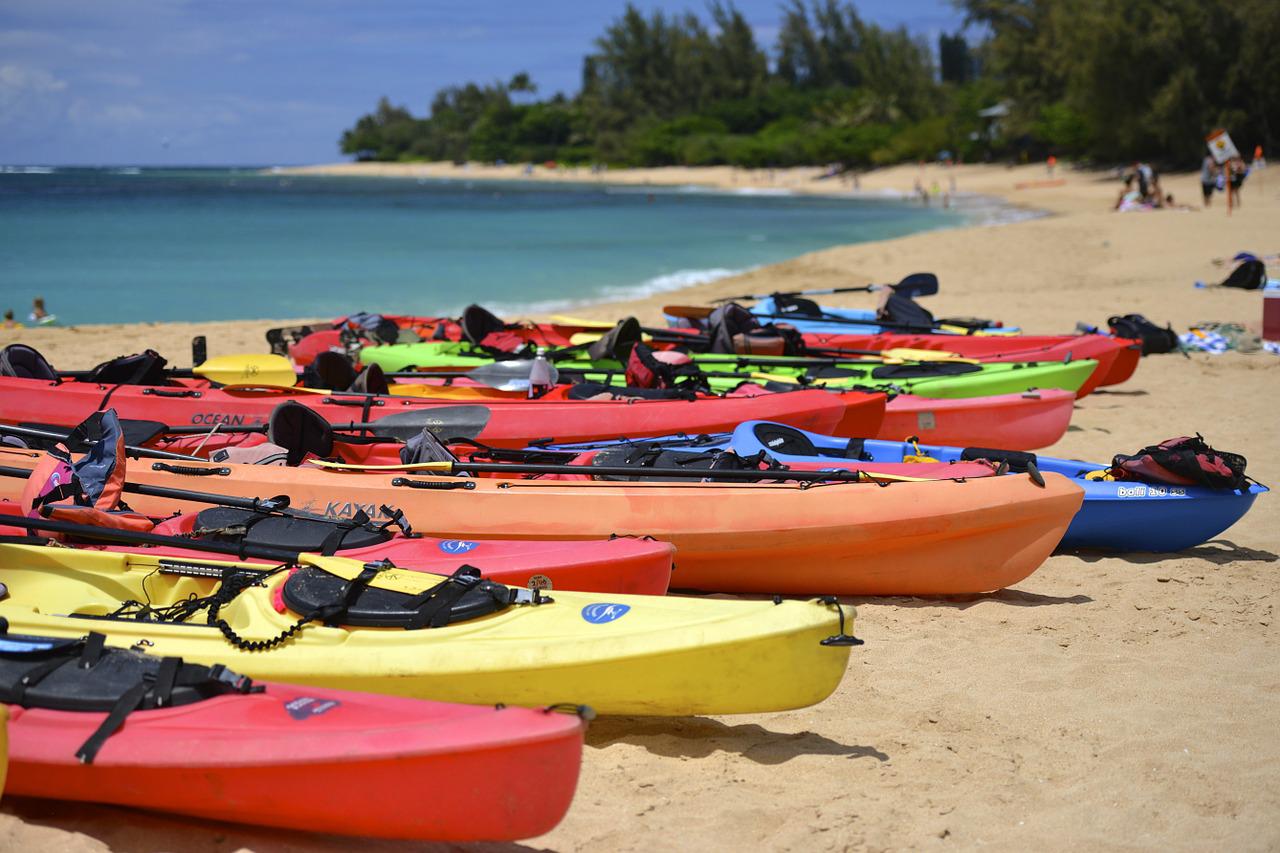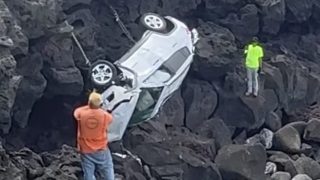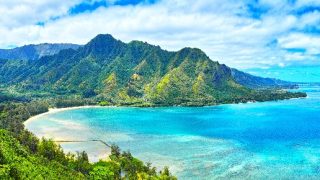Another Hawaii visitor air rescue occurred Sunday afternoon when a 23-year-old woman from Arizona was plucked from the trail leading to Kaihalulu red sand beach in Hana (pictured above). She reportedly incurred a foot and leg injury due to a fall.
This is also a known Maui trespassing problem area, and we are not sure if the visitor was on private or public land. Last fall, a 69-year-old Florida resident fell from the trail when hiking to the beach area by trespassing on marked private property. Other Maui rescue problem areas include Twins Falls and the Bamboo Forest Waterfall hikes along the Hana Highway.
The Honolulu Fire Department (HFD) says that just over half of all rescues are visitors.
While that is true, it also means that close to 50 percent are locals. As a spokesperson said:
“That’s our job. We respond, locate and bring to safety whoever may be lost or injured. Regardless of whether you are a resident or a visitor, the HFD urges the public to practice common sense before venturing outdoors to avoid endangering themselves or others and possibly becoming another rescue statistic.”
HFD recently reported that 55% of rescues are visitor-related, with the most common age of the injured being under 40 years old. Click on HFD rescue statistics for more details from last year.
Problems are exacerbated when trespassing is involved, such as this.
Who should pay for the rescue when venturing beyond warning signs or a locked gate and getting hurt? Many in Hawaii believe it’s time for responsibility to be that of the injured person. The Hawaii State Legislature has been trying to address this issue for the past few years. Six other states already charge for negligent-resultant search and rescue. Other states, like Colorado and Utah, offer nominal cost rescue insurance in lieu of reimbursement.
This question surfaced at treacherous Queen’s Bath on Kauai a few months ago. Then, a Florida visitor had to be airlifted by Kauai firefighters following a fall-related injury. The site had been closed to all visitation.
In another incident earlier this year on Big Island, a visitor climbed over a fence, fell, and was found dangling over a 400′ drop. A Hawaii resident, Aldwin Francis, defied the danger and rescued the man from falling off the cliff. Francis then said he “did not even receive a thank you for his life-saving efforts. For me, it’s good for him to be alive. That’s all that matters to me.”
The list is endless: Wailua Falls visitor trespassing rescue.
You’ll recall that not long ago, a man was rescued when hiking at Wailua Falls. The 67-year-old visitor from California slipped and then fell 25′ off the trail. He was hospitalized after being treated at the scene for multiple head injuries. Wailua Falls is one of Kauai’s most spectacular waterfalls. It features a 173′ drop. While a great viewpoint is available with parking at the top, going further involves trespassing and is deadly serious.
Don’t become a rescue statistic!
1. The Honolulu Fire Department recommends that you:
- Bring a cell phone with a full battery.
- Pack adequate water and stay hydrated.
- Keep track of time to avoid hiking at night
- Do not rely on social media for excursion planning.
2. We’ll add some of our own suggestions:
- Don’t snorkel or hike alone! If you’re not experienced, stay close to shore or in an area where you can still stand up in the ocean.
- Obey warning signs at beaches and trails. Ask lifeguards at the beach if you’re not sure.
- Wear hiking shoes on trails.
- Understand your physical condition and hike on appropriate trails for your level.
- Research trails before hiking. Sites like AllTrails can give you information on what to expect.
We want you to vacation injury free so you come back and enjoy more of our beautiful islands.







Gotta be kidding! Charging residents for rescue? I guess “accidents” went out the door, yeh???
What I’m going to say won’t be well received by some people, too bad! I know all to well that True Accidents do happen, the consequences can be devastating. Whether Accidental or Not your actions are endangering other lives that attempt to help or save you, read that part again! If you’re trespassing you should bare the Entire Cost of rescue, if not trespassing there should be some kind of cost paid by you as they came to help you. Residency shouldn’t matter regarding costs. Fines and Arrest should also apply if Laws have been violated! Interesting Article BOH, it’s time to help offset costs and in some cases Recoup them all. Rescue and Medical Responders are risking their lives with every call!
Hawaii could be truly progressive and have insurance for “dangerous activities” similar to DAN insurance for scuba divers. No insurance, you pay for the ride in the decompression chamber.
Why do those on the side of a cliff or other high risk activities get a “free ride”?
My personal problem with this insurance is that to some it’s like they have a license to do whatever they want, legal or Not. With numerous exclusions I could change my mind, it would be of enormous benefit to the average traveler depending on Cost.
Please add the bullet point “obey all trespassing signs”
If this information could be handed out on airlines, to captive audiences, more people might read the advice, and perhaps fewer rescues would be needed.
It is a conundrum. The nominal insurance fee would seem like just more nickel-and-diming to the people already upset about that. It might be hard to swallow for people that are not going to do anything more risky than reading on their lanai. As someone who has been young and dumb for almost their entire life, I’d much rather pay $10-20 and not need it than $10k or whatever it costs to hire a helicopter and a couple of EMTs to act as tour guides for an afternoon. As your story about Papakolea Beach makes clear, we All have our responsibilities to the ‘aina and each other, and it would make a tough pill to swallow all the more bitter if the insurance or reimbursement were only charged to visitors. That would not be fair.